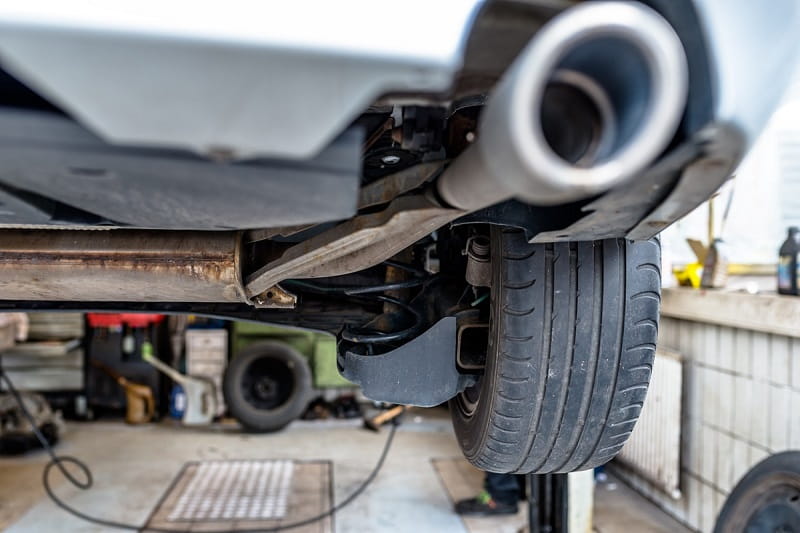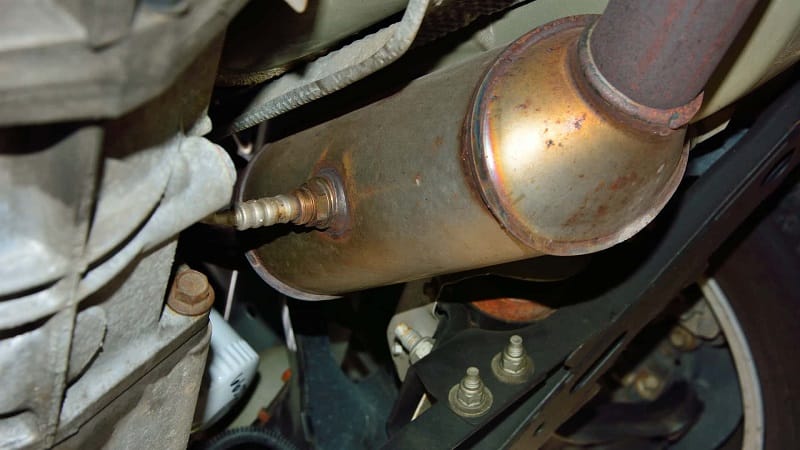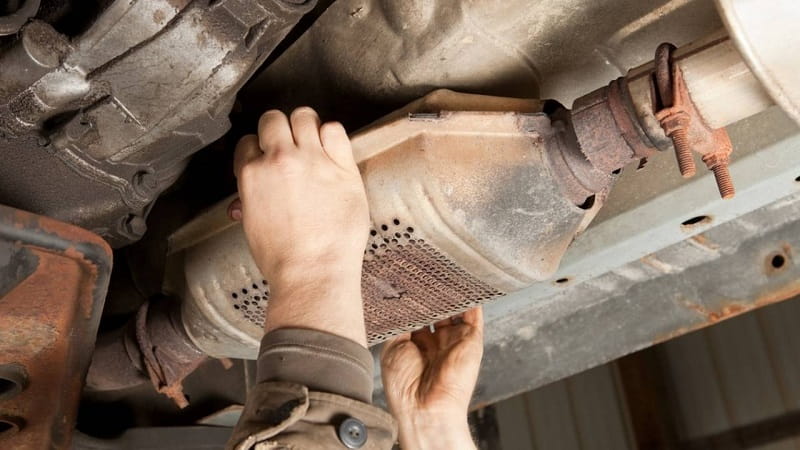This post contains affiliate links. This means I will make a commission at no extra cost to you should you click through and make a purchase [ “As an Amazon Associate, I earn from qualifying purchases.” ]. Read the full disclosure here.
How Much Does a Catalytic Converter Replacement Cost? A Complete Guide GuideMechanic.Com Your car’s catalytic converter plays a critical role in keeping your vehicle clean and eco-friendly. But like many essential car parts, it can wear out or fail over time.
If you’ve recently been told your catalytic converter needs replacing, you’re probably wondering: how much does a catalytic converter replacement cost?
In this comprehensive guide, we’ll break down the average costs, what affects pricing, and how you can potentially save money when replacing this vital part of your vehicle’s exhaust system.
See Also: Catalytic Converter Replacement Cost for Hyundai Elantra
How Much Does a Catalytic Converter Replacement Cost? A Complete Guide
What Is a Catalytic Converter and Why Is It Important?

A catalytic converter is part of your car’s exhaust system. It’s responsible for converting harmful exhaust gases—like carbon monoxide (CO), hydrocarbons (HC), and nitrogen oxides (NOx)—into less harmful emissions, such as carbon dioxide (CO₂) and water vapor.
Using a series of chemical reactions and precious metals like platinum, palladium, and rhodium, it reduces pollution and ensures your vehicle complies with environmental regulations.
In most regions, a failing or missing catalytic converter can prevent you from passing emissions tests—and in some areas, it’s illegal to drive without a working one.
How Much Does It Cost to Replace a Catalytic Converter?
The cost to replace a catalytic converter can vary greatly, depending on the make, model, and year of your vehicle, the type of converter, and your location.
General Cost Range
| Type of Vehicle | Replacement Cost Range (USD) |
|---|---|
| Economy Cars (e.g. Honda Civic) | $400 – $1,200 |
| Mid-Range Vehicles (e.g. Toyota Camry) | $700 – $1,800 |
| Luxury Cars (e.g. BMW, Audi) | $1,500 – $3,000+ |
| Hybrid Vehicles (e.g. Toyota Prius) | $1,200 – $2,500+ |
These estimates include parts and labor.
Parts vs. Labor Cost Breakdown
When replacing a catalytic converter, the major cost component is usually the part itself, not the labor.
Part Cost:
- Aftermarket catalytic converters: $200 – $1,000
- OEM (Original Equipment Manufacturer) converters: $800 – $2,500+
Labor Cost:
- Typically between $100 and $300, depending on labor rates and job complexity
- Labor may take 1.5 to 4 hours, depending on your vehicle
How Much Does It Cost to Replace a Catalytic Converter?
Why Are Catalytic Converters So Expensive?

The high price of catalytic converters is mainly due to the precious metals they contain. The three key metals—platinum, palladium, and rhodium—are rare and expensive. When metal prices spike, so does the cost of the catalytic converter.
In addition, modern vehicles often have multiple converters, especially larger or more powerful engines, further increasing the cost.
Factors That Influence Catalytic Converter Replacement Cost
Several factors will affect your final bill:
1. Vehicle Make and Model
Luxury or foreign brands often have more expensive parts. A converter for a BMW X5 can cost over $2,000, while one for a Toyota Corolla might be around $600.
2. OEM vs Aftermarket
OEM parts are designed specifically for your vehicle and generally last longer, but they are far more expensive. High-quality aftermarket converters can be more affordable but may not always meet emissions standards in places like California.
3. Your Location
Labor costs vary significantly by region. Plus, emissions regulations differ: states like California require CARB-compliant converters, which are more expensive than standard EPA-certified ones.
4. Single vs. Dual Converters
Some vehicles—especially V6 or V8 engines—have dual exhaust systems, requiring two converters. That effectively doubles your replacement cost.
5. Extent of Damage
If the converter has caused or been affected by additional damage (e.g. ruined O2 sensors, pipes, or engine misfires), your repair bill could be much higher.
Signs That Your Catalytic Converter Needs Replacing
Before you shell out for a new converter, it’s important to recognize the warning signs of a failing one:
- Check Engine Light (common code: P0420)
- Decreased engine performance
- Rattling noises (from broken internal components)
- Rotten egg smell from the exhaust
- Poor fuel economy
- Failed emissions test
If you notice any of these symptoms, it’s wise to get your vehicle inspected immediately.
Can You Drive Without a Catalytic Converter?
Technically, yes—but it’s not recommended for several reasons:
- It’s illegal in many regions to drive without a functioning catalytic converter
- Your car will likely fail emissions tests
- You may experience engine damage or performance loss
- You’ll release dangerous pollutants into the air
In short: replace it as soon as possible.
Catalytic Converter Theft: Why It Matters
In recent years, there has been a surge in catalytic converter thefts. Thieves steal them to extract the valuable metals and sell them on the black market.
Vehicles that are most at risk include:
- Hybrids (e.g. Toyota Prius) – higher concentration of precious metals
- Trucks/SUVs – higher ground clearance makes access easier
How to Protect Your Converter:
- Install a catalytic converter shield or cage
- Park in secure or well-lit areas
- Engrave your VIN number on the converter
- Set up motion-sensing alarms or cameras
Does Insurance Cover Catalytic Converter Replacement?
Yes—if you have comprehensive coverage.
If your catalytic converter is stolen, comprehensive insurance usually covers the replacement, minus your deductible. If the converter fails due to age or wear and tear, however, insurance won’t cover it.
Some extended warranties or emissions warranties may cover it if your vehicle is under a certain mileage or age—typically up to 8 years/80,000 miles in the U.S. under federal emissions law.
How to Save Money on Catalytic Converter Replacement

Here are some tips to reduce costs:
1. Get Multiple Quotes
Don’t settle for the first repair shop’s estimate. Prices vary widely between locations and mechanics.
2. Consider a Certified Aftermarket Converter
In many cases, a high-quality aftermarket converter will do the job at half the price of OEM.
3. Buy the Part Yourself
Some shops will let you purchase your own part online (from a reputable source) and only charge for labor.
4. Check for Recalls or Technical Service Bulletins (TSBs)
Your vehicle may be eligible for a free replacement if it falls under an emissions-related recall.
Final Thoughts
A catalytic converter is a vital part of your car’s exhaust system—and replacing it is never cheap. However, the cost depends heavily on your vehicle type, location, and the parts used.
To recap:
- Expect to pay $400 to $2,500+ for parts and labor
- Choose OEM for quality and compliance, or aftermarket for budget-friendly alternatives
- Protect your converter from theft
- Check your warranty or insurance coverage before paying out-of-pocket
By being proactive, comparing options, and knowing what to expect, you can make the most informed and cost-effective decision when it comes time to replace your catalytic converter.
- How Much Does a Catalytic Converter Replacement Cost - April 26, 2025
- Catalytic Converter Replacement Cost for Hyundai Elantra - April 26, 2025
- Catalytic Converter Replacement Cost for Hyundai Accent - April 26, 2025
